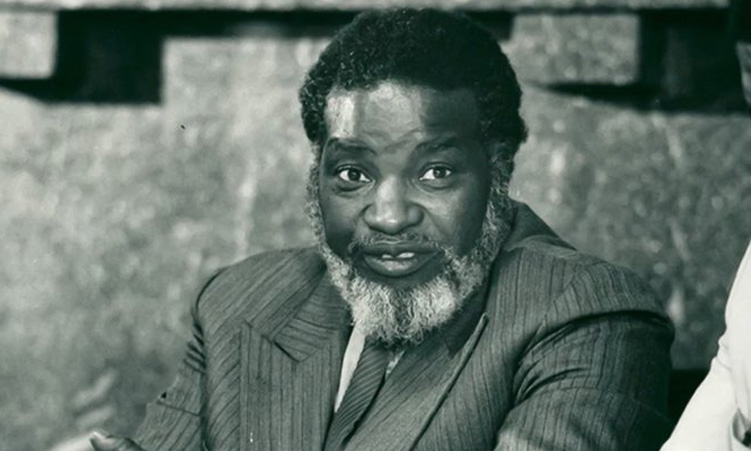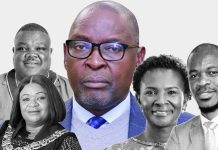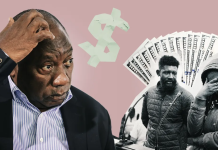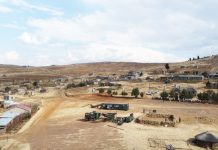By Graham Hopwood | February 10, 2025
Namibia is mourning the death of its founding president and ‘Father of the Nation’, Sam Nujoma.
Undoubtedly the most influential figure in Namibia’s history, he is widely recognised for leading the liberation struggle and shaping the country in its formative years of independence.
His legacy – defined by resilience, controversy, and an unwavering commitment to Namibia’s sovereignty – will endure for generations to come.
Sam Nujoma was born at Etunda in the Omusati region in northern Namibia on 12 May 1929.
He spent much of his early childhood looking after his siblings and tending the family’s cattle.
Educational opportunities were limited. He started attending a Finnish missionary school at Okahao when he was 10, and completed Standard 6 (Grade 8).
In 1946, when he was 17, he went to live with an aunt at the harbour town of Walvis Bay, where he worked in a general store and then at a whaling station.
The young Nujoma moved to Windhoek in 1949 and started working as a cleaner for the South African Railways (SAR), while attending night classes and undertaking a correspondence course, mainly with the aim of improving his English.
He married Kovambo Katjimune in 1956 and the couple were to have four children.
In the late 1950s, Nujoma’s political outlook was shaped by his work experiences, his awareness of the contract labour system, and his increasing knowledge of independence campaigns across Africa.
In 1957, at the age of 29, he resigned from the SAR so he could devote more time to politics. A year earlier he had visited Cape Town for the first time and met some of the Namibians who would go on to form the Ovamboland People’s Congress (OPC) there on 2 August 1957.
On 19 April 1959, the Ovamboland People’s Organisation (OPO) was formed with the dual aims of ending the contract labour system and having the then South West Africa placed under a United Nations trusteeship.
Nujoma was OPO’s first and only president. During the next year he travelled the country, often in secret, to spread the word about OPO.
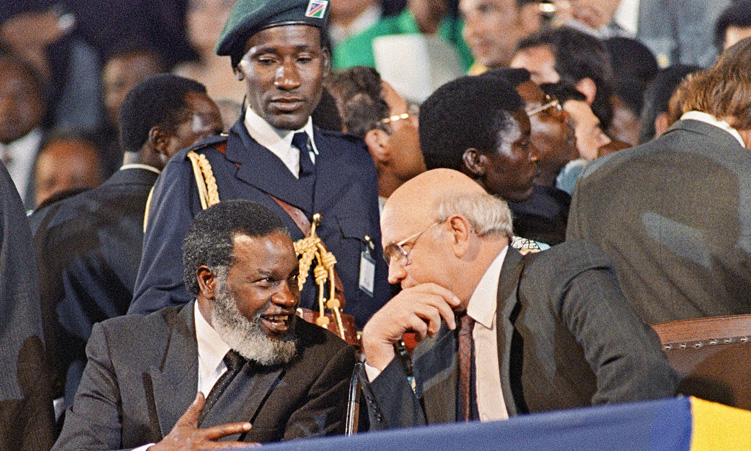
OLD LOCATION
In September 1959 he joined the executive committee of the South West Africa National Union (Swanu), which at the time was seen as an umbrella body for anti-colonial resistance groups, including OPO.
Nujoma was at the forefront of the campaign against the forced removal of inhabitants of Windhoek’s Old Location to Katutura. Matters came to a head on 10 December 1959 when the police opened fire on a crowd of protesters, killing 12 people.
In the wake of the shootings, Nujoma faced the threat of deportation to the north of the country as the authorities clamped down on the emerging nationalist movement.
In February 1960, OPO decided that Nujoma should leave the country to join those Namibians already lobbying at the United Nations (UN) for Namibia’s self-determination. Nujoma had already petitioned the UN through letters also signed by Herero chief Hosea Kutako and Nama chief Samuel Witbooi.
Nujoma left Namibia on 29 February 1960, crossing into Botswana (then Bechuanaland) and from there, using the false name of ‘David Chipinga’, travelling to Bulawayo by train. He flew from Bulawayo, then in Southern Rhodesia, to Salisbury (now Harare) and on to Ndola.
Finally, he made it to Mbeya in eastern Tanzania, which was still the British colony of Tanganyika, on 21 March 1960. While in Tanzania he received permission to address the UN Committee on South West Africa in New York.
Nujoma arrived in independent Ghana in April 1960 and met president Kwame Nkrumah, among other African leaders. His early encounters with the likes of Nkrumah and Gamal Abdel Nasser of Egypt left a lasting impression and informed his pan-African outlook.
From Ghana he moved to Liberia where the decision was taken to give OPO a national character by changing its name to the South West Africa People’s Organisation (Swapo). Nujoma was confirmed as president of the reconstituted movement.
He arrived in New York in June and stayed for the rest of the year. He petitioned the UN several times, arguing that South West Africa should be given its independence by 1963 at the latest.
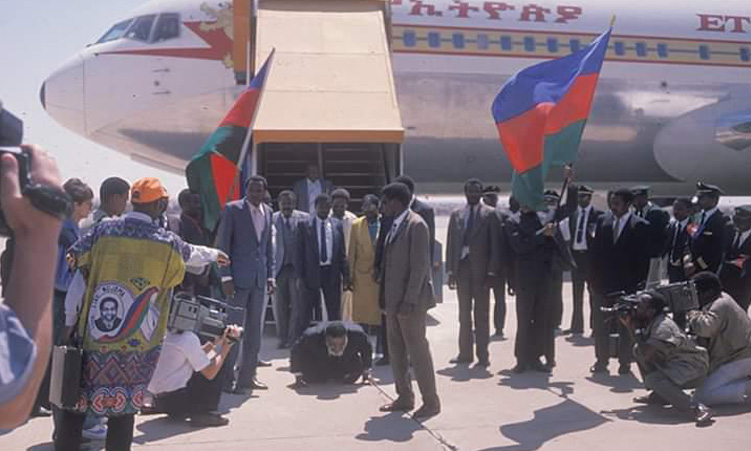
TANZANIA BASE
In early 1961 Nujoma returned to Tanzania, from where he and a small group of activists would develop Swapo into an international force within a decade.
As one of few Namibians in Dar es Salaam, Nujoma looked for support from other African nationalists and received strong backing from Julius Nyerere, the future leader of the East African country.
Nujoma established Swapo’s provisional headquarters in Dar es Salaam and arranged scholarships and military training for Namibians who had started to join him there.
Among the first arrivals were Simon Mzee Kaukungwa, Mosé Tjitendero, Hifikepunye Pohamba and Nickey Iyambo. He also attended numerous international conferences, and his diplomatic forays started to pay off when the Organisation of African Unity (OAU) recognised Swapo in 1965.
From the early 1960s, Swapo planned to launch an armed struggle. Nujoma himself procured the first weapons from Algeria.
Before the fighting started, Nujoma, accompanied by Pohamba, decided to challenge the South African assertion that they were in self-imposed exile by returning to Windhoek.
They flew in on 21 March 1966, only to be arrested on arrival and deported to Zambia 16 hours later.
ARMED STRUGGLE
On 26 August 1966, the first armed clash of the liberation struggle took place when the South African police attacked Swapo combatants who had set up a camp at Omugulugwombashe.
At the end of 1969, Nujoma was reaffirmed as Swapo president at the Tanga Consultative Conference in Tanzania.
In the late 1960s Nujoma continued his diplomatic rounds as Swapo set up offices across Africa, Europe and the Americas.
Although ostensibly based in Zambia from the early 1970s (after Swapo moved its headquarters to Lusaka), Nujoma was living out of a suitcase for much of the time. He acknowledged in his autobiography, ‘Where Others Wavered’, that he “spent a large part of each year in hotel rooms and conference halls”.
A diplomatic breakthrough came in October 1971 when Nujoma became the first African liberation movement leader to address the UN Security Council.
This international campaigning bore further fruit at the end of 1973 when the UN General Assembly recognised Swapo as the “authentic representative of the Namibian people”.
In 1975 one of Namibia’s earliest petitioners at the UN, Jariretundu Kozonguizi, attributed Swapo’s success on the world stage to Nujoma’s dynamism.
“Their [Swapo’s] single advantage has been in the single-mindedness and presence in their lobby of the person of their president. It is not an exaggeration to say that during the last 15 years he had hardly spent a month in one place,” ‘Where Others Wavered’ states.

DARK DAYS
In 1974 the Portuguese empire collapsed and Namibia’s border with Angola opened up.
Nujoma recognised that this paved the way for major changes in the way the war was being fought and over the next two years Swapo’s military campaign shifted its base from Zambia to Angola.
The opening of the border enabled thousands of Swapo supporters to stream out of Namibia to join the movement in exile. Nujoma’s three sons were among those who arrived in Zambia (his daughter had died while still an infant).
The sudden upsurge in the numbers leaving the country precipitated a major challenge to Nujoma’s authority.
Among the exodus were Swapo Youth League (SYL) activists who arrived in Zambia with high expectations and were soon seeking representation in Swapo’s structures and a congress to review the movement’s progress.
Their demands coincided with unrest among People’s Liberation Army of Namibia (Plan) recruits in western Zambia, who complained of logistical problems and wanted better food and more weapons.
The Swapo leadership called in the Zambian army to calm the rebellion.
Several SYL activists and some well-known Swapo leaders such as Andreas Shipanga were arrested in Lusaka and ultimately sent to Tanzania, where they were imprisoned until 1977.
More than 1 000 Plan combatants were held at the Mboroma camp near Kabwe – an unknown number were killed, while the rest eventually opted either to rejoin Swapo or leave the movement.
Nujoma put the blame for the crisis on the shoulders of Shipanga and other unknown “infiltrators”, as stated in ‘Where Others Wavered’.
In the 1980s, hundreds of Namibians who joined Swapo in exile would also be accused of being enemy agents. They were detained and tortured at Lubango in southern Angola by Swapo’s security apparatus.
Even Nujoma’s wife, Kovambo, was eventually caught up in the paranoia about enemy infiltration and was placed under house arrest at Lubango in 1988.
The ‘detainees saga’ of the 1980s remains as one of the most glaring blemishes on his leadership record, especially as Swapo has never acknowledged the suffering of those who were wrongly detained, tortured, and in some cases ‘disappeared’.

DIPLOMATIC PUSH
In the late 1970s, Nujoma led the Swapo delegation to talks with the Western Contact Group (West Germany, Britain, France, USA and Canada) about proposals that would eventually become UN Security Council Resolution 435, passed in September 1978.
While agreement on Resolution 435, which embodied the plan for free and fair elections in Namibia, was undoubtedly a diplomatic coup, its implementation became bogged down for another 10 years.
South African delaying tactics and the Ronald Reagan administration’s decision to link a Cuban withdrawal from Angola to Namibian independence frustrated hopes of an immediate settlement.
Namibia’s independence process got off to a rocky start on 1 April 1989, when Nujoma ordered Plan combatants to cross the Angolan border into Namibia to report to UN officials.
At the time there were hardly any UN representatives in northern Namibia and the young fighters found themselves being mowed down by the South African security services.
It was not until 14 September 1989 that Nujoma returned to a hero’s welcome from Swapo supporters at Windhoek’s international airport.
His long exile, rather than diminishing his importance inside Namibia, had resulted in him becoming a near-mythical figure for many. He was greeted at the airport by his 89-year-old mother and by the rest of the Swapo leadership.
Nujoma immediately hit the campaign trail as the UN-supervised elections were only two months away.
Swapo’s success in that initial election (gaining 57% support) was eclipsed by its share of the vote in succeeding elections. After independence, no opposition politician made any inroads into his personal popularity at the polls.
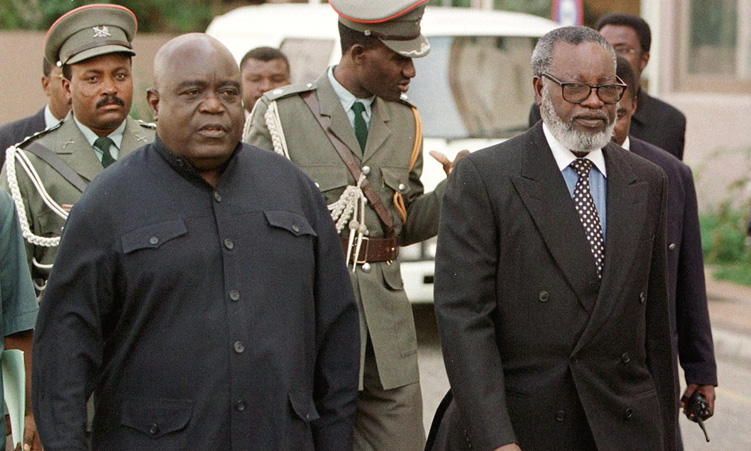
IN GOVERNMENT
Nujoma’s approach to politics was pragmatic rather than ideological. While he was at pains to give credit to the Soviet Union, the Eastern Bloc and Cuba for aiding Swapo during the struggle, he was keen to point out that he was never a Marxist-Leninist and that perceptions of Swapo as a communist movement were wrong.
At independence, he introduced the policy of national reconciliation, which, although never formally documented, played a crucial role in establishing Namibia’s long-standing reputation for peace and stability.
In March 1990, Nujoma put this policy into practice by appointing opposition members of parliament (MPs) as deputy ministers and forming a multi-racial cabinet, fostering inclusivity in the new government.
One of the enduring themes in his speeches after independence was his belief in pan-Africanism and the quest against imperialism. Many of his words echoed the nationalist statements he made on behalf of Swapo some 60 years ago.
In 1998 Nujoma came to the defence of Democratic Republic of Congo (DRC) president Laurent Kabila when his rule came under threat from rebels backed by Rwanda and Uganda.
Namibian, Angolan and Zimbabwean troops helped Kabila fend off the attacks – a move Nujoma saw as defending the DRC’s sovereignty against outside interference.
In the late 1990s, Nujoma allowed Angolan government troops (FAA) to use Namibian territory to launch attacks on Unita. The move cost civilian lives, as Unita launched retaliatory attacks, but did contribute to the weakening and eventual defeat of Jonas Savimbi’s movement in 2002.
He also oversaw the quelling of a secessionist grouping in the Caprivi (now Zambezi) region after a short-lived but violent uprising in August 1999. A four-month state of emergency was imposed and a significant number of those arrested were tortured.
Although Nujoma was undoubtedly a key shaper of Namibia’s democracy in its early years, he had no difficulty in retaining cordial relations with brutal dictators such as Suharto of Indonesia and Abacha of Nigeria.
Similarly, Nujoma only had words of solidarity for Robert Mugabe despite the ruinous effect of his rule on Zimbabwe.
Nujoma commanded great loyalty and found it hard to tolerate anything that might be seen as disloyalty. Those who crossed him were liable to join his list of traitors – which included Shipanga, Muyongo and Savimbi.
Nujoma’s presidency, especially from the mid-1990s onwards, was marked by angry outbursts – during which ‘homosexuals’ and ‘Boers’ were often lambasted.
These attacks on minorities and his close relationship with Mugabe occupied many of the column inches about Namibia in the international press, which often portrayed Nujoma as a proto-Mugabe figure, even though there were major differences between the two countries’ policies.
In 2002 at the UN summit in Johannesburg, Nujoma made a widely publicised attack on Tony Blair, accusing the British prime minister of being responsible for many of the problems in Zimbabwe.
In 1998, the Constitution was changed to allow Nujoma to stand for the presidency for a third time in elections at the end of 1999. The change from the two-term limit was only to apply to Nujoma as founding president.
In Namibia’s first presidential election in 1994 he won 74% of the vote. Five years later, after the Constitution was changed to allow Nujoma to stand for a third term, his share of the vote increased to 77%, slightly in excess of Swapo’s popularity.
During his final term in office, the Anti-Corruption Act was passed in 2003, laying the legal groundwork for combating corruption. However, the Anti-Corruption Commission (ACC), established by the law, was only set up in 2006 – after Nujoma had stepped down.
Towards the end of his tenure, Nujoma appointed several commissions of inquiry to investigate alleged irregularities at various state-owned enterprises and government agencies.
Despite damning testimony at commission hearings, little to no action was taken in response to their findings.
While he was known for his sharp rejection of those he perceived as undermining Swapo, Namibia, or Africa, he also went to great trouble to keep different interest groups on board – within party structures, the Cabinet, and the parliament.
In this sense, he embodied Swapo’s long-standing slogan, ‘One Namibia, One Nation’, which played a crucial role in shaping national identity during the early years of independence.
Very few ministers were dropped, although the dismissals of Hage Geingob in 2002 and Hidipo Hamutenya in 2004 did indicate that even senior party figures could fall into disfavour if they were seen to be challenging Nujoma’s will on crucial issues.
Although he regularly criticised media houses and journalists he perceived as hostile to Swapo and his administration, press freedom in Namibia was largely upheld during his time in office.
He did respond harshly to critical reporting in 2001 when he prompted the Cabinet to impose a ban on government advertising in The Namibian and the purchase of the newspaper.
The ban was only rescinded a decade later when president Hifikepunye Pohamba was in power.
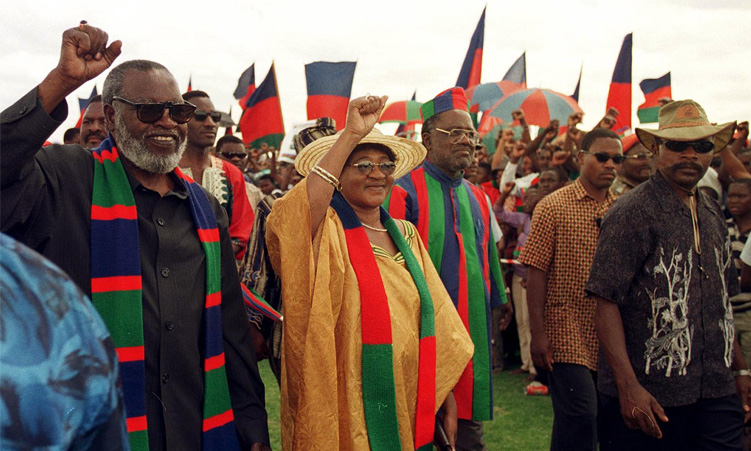
A PRIVATE LIFE?
It is difficult to separate Nujoma’s personal story from the history of Swapo and the struggle for Namibian independence.
Attempts to uncover the private Nujoma have never revealed much more than that his favourite books were ones that dealt with politics and economics (he never read fiction, saying it was a waste of time) and that liberation songs from the struggle were his music of choice.
His radio was never far from his side – tuned into NBC and news broadcasts from around the world, reflecting how he kept in touch during the struggle years.
Nujoma’s formidable energy and the fact that he spurned luxurious living helped win him support that went much wider than hardened Swapo cadres.
His willingness to get his hands dirty in the cause of development also broadened his appeal. In 2002 he led by example and mobilised hundreds of Namibians to participate in the extension of the Northern Railway Line to the Angolan border. However, despite the significant effort invested in its construction, the railway has remained underutilised, failing to achieve its full economic potential.
Once it was clear that he had decided not to seek another term in office, Nujoma set his sights on ensuring that his chosen successor, Hifikepunye Pohamba, would win the nomination to be Swapo’s presidential candidate in the 2004 elections.
Swapo decided to hold a special congress to select a candidate from three contenders – Pohamba, Hamutenya and Nahas Angula – in May 2004.
In a move that would open up fault lines in the party, Nujoma sacked Hamutenya as his foreign minister just days before the congress.
The official reason, as stated in his letter of dismissal, was Hamutenya’s alleged meddling in Swapo’s internal politics in the Omaheke region. However, the charge was never followed up with any investigation or disciplinary action.
The effect of the sacking was to diminish Hamutenya’s chances of overcoming Nujoma’s chosen candidate – Pohamba. In the end, Pohamba won the nomination after a second round of voting and would cruise to victory in the presidential elections later in the year.

In 2001, Nujoma’s autobiography, ‘Where Others Wavered: My Life in Swapo and My Participation in the Liberation Struggle of Namibia’, was published by Panaf. In 2007 a government-financed film based on the book was released.
Nujoma was the chancellor of the University of Namibia (Unam) from 1993 until 2011. In late 2005, he was accorded the official title ‘Founding Father of the Namibian Nation’ through an act of parliament.
In March 2005, Nujoma retired as head of state at the end of his third term in office.
He stood down as the president of Swapo at a congress held at the end of 2007.
In 2009 he completed a master’s degree in geology at Unam.
Shortly after his retirement as head of state, he established the Sam Nujoma Foundation as a charitable organisation.
Nujoma leaves behind a nation forever shaped by his personal journey from revolutionary to head of state.
His leadership was instrumental in guiding Namibia through its defining era. In death, as in life, he stands as a symbol of the nation’s struggle and its aspirations for the future.
– Graham Hopwood is the executive director of the Institute for Public Policy Research (IPPR) in Windhoek. He was a political reporter for The Namibian in the 1990s and an anti-apartheid activist working on the campaign for Namibian independence from 1985. He is the author of ‘Guide to Namibian Politics’ and numerous articles on Namibia’s politics and history.te globally with no oversight or legal right to operate in regulated jurisdictions.

